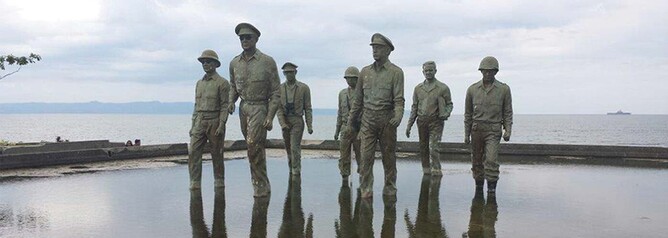Multiculturalism
From a Ukrainian father and an English mother, I was born in the UK and migrated to Australia at age six. I was raised in a new church plant in 1968 which brought together Dutch, Scottish, German, white and coloured South Africans, Italians, New Zealanders, Hungarian, Asian, Maori and Aboriginal people, all worshipping together — this set the background for my cross-cultural ministry. I have a brother-in-law who is Greek and another who is Irish, then I married a Filipino with Chinese, Spanish and Muslim heritage. We are a multicultural family at its core
Shaped by Family
My values and attitudes, and later my ministry, were largely shaped by this environment. The Eastern Europeans are passionate people. The British are proud and resolute. Both mum and dad experienced World War II in different ways. My dad was a displaced person on the run from Communist Russia and given refugee status in England. My mum was a young girl experiencing air raids across the English Channel from Nazi Germany, followed by England and her allies fighting back to triumph. Their faith and God’s call on them both found its way into my heart.
Conflict of Cultures
Dr Don Nicholls (AMT missionary in Taiwan) once visited our ministry here in Guiuan, and during one of our conversations made the poignant statement that we ought not to focus on Australian or Filipino culture, but focus on “the culture of the kingdom”. That statement has shaped my thoughts ever since when discussions of culture arise. It set me on the road to distilling “What is the culture of Christ’s kingdom?” as opposed to all the subcultures that have shaped me. Truly we are shaped by our family, our school, our local community and our church environment, and somewhere among all that we have to determine what the essence of God’s Kingdom is. I often feel conflicted and discontented with both Australian and Filipino cultures. Sometimes I don’t know where I belong, although I feel it is Australia. The truth is Heaven is our home.
Dynamic Culture
Cultures are not static but evolving. With a ministry spanning 35 years in the Philippines, in two very different locations and cultures, I came back to Australia every three or so years for furlough and get what might be called ‘reverse culture shock’. I have these snapshots of the changes that have occurred in my home country. In my first couple of furloughs I used to think Philippines development was 20 years behind Australia. However, Australia has caught up fast! Small things like waiting in line, impersonal government services, and more recently a lack of trust in business, inflexible systems, corruption in business, monopolies, blackouts, automated replies and electoral fraud, to name a few.
Trust
Lack of trust was one of the things that most struck me in my first few years here. This was probably one of the most sobering cultural traits that hit me. Locals would keep telling me “Don’t trust anyone.” “Don’t trust the Taxi Cab driver — make sure he puts the meter on.” “Don’t trust the money changer — check your exchange rate and check each bill to make sure it’s not fake.” “Don’t trust your house help; keep everything under lock and key.” When it comes to business, you have to pay up first before you get any work done. I purchase an item and guarantees or warranties are meaningless. I pondered on how a society can operate without some level of trust.
Lack of trust impacts on every aspect of life from business to personal relationships in marriage, from things we say and promises we make. And, of course, the key area in the spiritual world is trust in Jesus Christ for our salvation. How do you convey the idea of trust in a God you can’t see? How do you have faith in His Word the Bible and accept what it says? How do you hold on to His promises?
Surely the answer is in what happens when we become a missionary — an ambassador sent to represent our country, its King and His values. For others to trust in God it begins with their trust in me. People need to trust me first. Then we help transfer the trust placed in us to the One Who will never let them down by pointing the way to Him. Lengthy service to a community, faithfulness to the end, and a lifelong commitment (even if we move on) needs to be modelled. We know God will never let us down; for those looking on, they need to see that in our actions.
Impact of History on Culture Origins
How a society organises itself reveals much of its cultural values — Philippines history has greatly influenced its current culture. The ‘Barangay’ (village) is the lowest level of local government and is derived from a word used for the small boat in which the first Indo-Malay settlers came from Borneo and spread through out the archipelago. Chinese merchants traded with these people, eventually becoming the dominant founders of businesses in the Philippines. Our food is rooted in Chinese cuisine.
Spanish influence
Next came the Spanish, bringing Roman Catholicism and culture from Europe, and they organised the local barangays into Municipalities. The Plaza formed the centre of the community. Dominating the landscape was the towering Catholic Church at one end, the marketplace on one side, major businesses and banks on the other, and the influential families at the far end. Municipios were formed which were heavily influenced by the priest and clergy. This brought the villages together.
Through this period, time, currency and weights were introduced and took on their Spanish names. The bell was introduced to regulate time and call people together for worship. Money, the peso, was circulated for income and payment of taxes. Large tracts of land were formed into haciendas owned by the friars and Jesuits. Building technology in the use of masonry skills to quarry, cut and mount large blocks and process huge trees took place as European-style cathedrals were built and Spanish-style architecture used for private residences. ‘Modern technology’ relative to household goods, furniture and mechanical things changed life for people.
The local language was impacted by Spanish. One example is the word ‘Seguro’ which in Spanish means ‘certain and sure’, but for the Filipino has come to mean ‘maybe, perhaps’. This was due to the way in which the conquerors could not be trusted and often deceived the local Captains. Was it this that created the breakdown of trust for the local people?
Language and culture
Language conveys so much of culture and learning that it is a huge topic in and of itself. Whilst enfleshing the gospel in living the culture we must also learn how to communicate it in words. This is a lifelong challenge. Just as people need to see a life modelled over the long haul, attempting to learn language, above all, shows love and a real desire to communicate the gospel in a meaningful way. It is the commitment to long-term involvement. Sure, I could work in English as so many people understand it here, but knowing the local language helps you to know the culture. Coming back to the culture of the Kingdom, God spoke by learning our language when He sent Jesus as a man to this earth, who took on flesh and experienced all the things we experience so that He could relate to us. Jesus not only represented His Father, but He explained Him to us (Jn 1:14,18).
American influence
The next dominating influence on Philippine culture was American democracy. The Philippines was awarded to America by Spain as compensation for losses during the Spanish-American war in 1898. America introduced Western democracy. A revamp of titling and land ownership gave land to the locals in the first of many agrarian reforms. The Philippines was first known as a Commonwealth, then after WWII gained its independence and became a Republic modelled somewhat after the American system, with a President, Senate, Congress and Supreme court (Chief Justice). Education along with the English language was introduced. From the early 20th Century right through until I first came in 1983, America was held in awe and almost every Filipino dreamed of migrating to America. Japan had control of the Philippines for a period of three years when General Douglas MacArthur was forced to withdraw to Australia, but he declared and eventually kept his famous promise “I will return”.
SIR
Under all of these regimes, the local Filipino adapted and accommodated and learnt how to trade his way out of trouble, to keep on the right side of the ruling power, make deals to survive, to get along with everyone — a cultural trait that is summed up in the acronym SIR: Smooth Interpersonal Relationships.
To some degree we see this as flip-flopping and insincerity; falseness, even lies, saying “Yes” when they really mean “No” (or are undecided); displaying a plastic veneer for show (saving face); compromising principles, a lack of commitment, and leaving things up to fate. For us we see all sorts of ‘negative’ terms. But seeking to live in peace with all men was Paul’s counsel to the Romans (12:18) and also echoed in Hebrews (12:14).
Addressing culture, Paul summed up his purpose in 1 Cor 9:22-23 — I have become all things to all people so that by all possible means I might save some. I do all this for the sake of the gospel, that I may share in its blessings.
We need to understand culture and learn to speak the local language, but our goal is to teach and model the culture of the Kingdom of God, not our own national culture or family subcultures.
by Paul Kulikovsky


